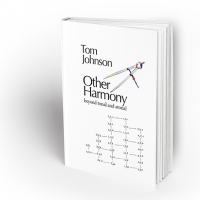Other Harmony
Vendredi 6 mars 2015
14h30
IRCAM - Salle Stravinsky
1, place Igor Stravinsky 75004 Paris
Entrée libre
Avec la participation de Tom Johnson, Emmanuel Amiot, et Franck Jedrzejewski.
Programme
- 14h30-15h15 : Franck Jedrzejewski - From Total Harmony to Combinatorial Harmony
- 15h15-16h00 : Tom Johnson - Other Harmony
- 16h00-16h45 : Emmanuel Amiot - Tom Johnson l'exhaustif
This session will revolve around the new book by Tom Johnson: Other Harmony, Beyond Tonal and Atonal, but rather than discussing the book in itself, and the music of Tom Johnson that lies behind it, we want to take these ideas further and use it to pose some new questions.
[Voir la séance en video]
[Fermer]
Résumé des interventions
Other Harmony
Tom Johnson
Hundreds of harmony books have been devoted to tonality, and many have dealt with atonality, which has usually meant serialism, but this book considers all of the Other Harmony that has dominated musical practice for at least 50 years. After considering theories of Forte, Euler, Hauer, Slonimsky, Obouhow, Schillinger, and Messiaen, the book considers some of my own harmonic practices having to do with heights, sums modulo n, homometric pairs and combinatorial designs. I will do my best to summarize the Important points in all this, playing some musical examples, and to talking about some of the questions I still have.
From Total Harmony to Combinatorial Harmony
Franck Jedrzejewski
Historical reflections of harmony beyond tonal and atonal via Johnson's examples of Euler, Obouhow, Hauer, Slonimsky, Schillinger and Messiaen, and some others. From Edmond Costere Affinity tables to the new list of Homometric multiplets that I compute, and used by Stéphane de Gerando, I will try to understand what remains or what musical harmony means today.
Tom Johnson l'exhaustif
Emmanuel Amiot
La collaboration entre le compositeur Tom Johnson et le monde mathématique est étonnament longue et fructueuse. Elle ne peut s'expliquer simplement par l'étiquette de "minimaliste" qui lui est attachée, car pour la plupart des autres compositeurs de cette mouvance le rapport aux mathématiques est bien plus ténu. Je tenterai d'explorer plutôt des convergences de pensée, de méthodes, d'objectif, en m'appuyant notamment sur son dernier ouvrage Other Harmony.
